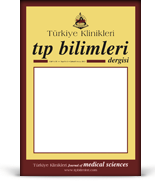Amaç: Çalışmamız, kanser hastalarının koronavirüs hastalığı2019 [coronavirus disease-2019 (COVID-19)] ile ilgili farkındalıkları, tedbirlere uyumları ve sağlık hizmetlerine erişimlerini hastalardan alınan bilgiler doğrultusunda irdelemeyi amaçlamıştır. Gereç ve Yöntemler: 1 Aralık 2019-31 Mart 2020 arasındaki 4 aylık periyotta Ankara Üniversitesi Cerrahi Onkoloji Kliniğinde kanser nedeni ile ilk kez opere edilen hastalar bulunarak telefonla iletişim sağlandı. On üç soruluk kısa bir anket uygulanması için telefonlarına, yakınlarının telefonlarına veya mail adreslerine Google Formlar (Google Inc, California, ABD) kullanılarak yapılan anket linki gönderildi. Bulgular: Popülasyon, %58,4 (n=83) kadın, %41,5 (59) erkek hastalardan oluşmakta idi. Ortalama yaş 55,97±18,8 olarak tespit edildi. Hastalar maske, mesafe ve hijyen kurallarına %73 (n=104) oranla tamamen uyduğunu, %20 (n=29) hasta ise kurallara sıklıkla uyduğunu belirtmiştir. %40,1 hasta ise bu süreç içerisinde acil bir durum gelişmedikçe hastaneye başvurmadığını beyan etti. Hastaların %40,8'i COVID-19 ve salgın hastalıklardan korktukları yanıtını verirken, %59,2'lik hasta grubu ise kanser hastalığım şıkkını seçmiştir. Sonuç: Çalışmamız, kanser hastalarının çoğunun pandemiden öncesinde dahi maske, mesafe ve hijyen kurallarını kısmen uygulamakla birlikte, pandemi sürecinde bu tedbirlere daha fazla önem göstermiş olduğu görülmüştür. Ancak kanser hastalarındaki bu hassasiyetin, hastane başvurularında gecikme ve özellikle tanı aşamasında gecikmelere yol açabileceği aşikârdır.
Anahtar Kelimeler: Enfeksiyon; kanser; sağlık hizmetleri; pandemi
Objective: Our study aimed to examine the awareness of cancer patients about coronavirus disease-2019 (COVID-19), their compliance with the measures and their access to health services in line with the information received from the patients. Material and Methods: In the 4-month period between December 1, 2019 and March 31, 2020, patients who were operated for the first time due to cancer were found in Ankara University Surgical Oncology Clinic and communication was established by phone. In order to apply a short questionnaire with 13 questions, a questionnaire link made using Google forms (Google Inc, California, USA) was sent to their phones, their relatives' phones or e-mail addresses. Results: The population consisted of 58.4% (n=83) female and 41.5% (59) male patients. The mean age was 55.97±18.8 years. The patients stated that 73% (n=104) completely complied with the mask distance and hygiene rules, 20% (n=29) of them stated that they followed the rules frequently. 40.1% of the patients stated that they did not apply to the hospital unless an emergency occurred during this period. While 40.8% of the patients answered that they feared COVID-19 and epidemic diseases, 59.2% of the patients chose the option of cancer. Conclusion: Although most of the cancer patients in our study partially applied the mask distance and hygiene rules even before the pandemic, it was observed that these measures were more important during the pandemic process. However, it is obvious that this sensitivity in cancer patients may cause delays in hospital admissions and especially in the diagnosis stage.
Keywords: Infections; cancer; health services; pandemics
- ACS. About the coronavirus disease 2019 (COVID-19).[Link]
- CDC. CDC Recommendation: Postpone non-urgent dental procedures,surgeries, and visits.[Link]
- Sağlık Bakanlığı Sağlık Hizmetleri Genel Müdürlüğü. Elektif işlemlerinertelenmesi ve diğer alınacak tedbirler.[Link]
- Liang W, Guan W, Chen R, Wang W,Li J, Xu K, et al. Cancer patients in SARS-CoV-2 infection: a nationwide analysis in China.Lancet Oncol. 2020;21(3):335-7.[Crossref] [PubMed] [PMC]
- Zhu N, Zhang D, Wang W, Li X, YangB, Song J, et al. A novel coronavirus from patients with pneumonia in China, 2019. N Engl JMed. 2020;20;382(8):727-33.[Crossref] [PubMed] [PMC]
- Wang C, Pan R, Wan X, Tan Y, Xu L,McIntyre RS, et al. A longitudinal study on the mental health of general population duringthe COVID-19 epidemic in China. Brain Behav Immun. 2020;87:40-8.[Crossref] [PubMed] [PMC]
- Yang J, Zheng Y, Gou X, Pu K, ChenZ, Guo Q, et al. Prevalence of comorbidities and its effects in patients infected withSARS-CoV-2: a systematic review and meta-analysis. Int J Infect Dis. 2020;94:91-5.[Crossref] [PubMed] [PMC]
- Turaga KK, Girotra S. Are weharming cancer patients by delaying their cancer surgery during the COVID-19 pandemic? AnnSurg. 2020;2:10.1097/SLA.0000000000003967.[Crossref] [PubMed] [PMC]
- Liang W, Guan W, Chen R, Wang W,Li J, Xu K, et al. Cancer patients in SARS-CoV-2 infection: a nationwide analysis in China.Lancet Oncol. 2020;21(3):335-7.[Crossref] [PubMed] [PMC]
- Casanova M, Pagani Bagliacca E,Silva M, Patriarca C, Veneroni L, Clerici CA, et al. How young patients with cancer perceivethe COVID-19 (coronavirus) epidemic in Milan, Italy: is there room for other fears? PediatrBlood Cancer. 2020;67(7):e28318.[Crossref] [PubMed]
- Aydin S, Balci A. COVID-19knowledge level research in nurses. Journal of Surgery and Research. 2020;3:198-203.[Crossref]
- Musche V, Bäuerle A, Steinbach J,Schweda A, Hetkamp M, Weismüller B, et al. COVID-19-related fear and health-related safetybehavior in oncological patients. front psychol. 2020;5;11:1984.[Crossref] [PubMed] [PMC]
- Wang Y, Duan Z, Ma Z, Mao Y, LiX, Wilson A, et al. Epidemiology of mental health problems among patients with cancer duringCOVID-19 pandemic. Transl Psychiatry. 2020;31;10(1):263.[Crossref] [PubMed] [PMC]
- Collard MK, Lefèvre JH, BatteuxF, Parc Y. COVID-19 heath crisis: less colorectal resections and yet no more peritonitis orbowel obstruction as a collateral effect? Colorectal Dis. 2020;22(10):1229-30.[Crossref] [PubMed] [PMC]
- Bagus BI, Bagus MI, Ayu SI, Kade MIA. Increasing of emergencypresentation on colorectal cancer patients during COVID-19 pandemic: a retrospective studyon single-center academic hospital. Clinical Cancer Research. 2020;26(18).[Link]







.: Process List